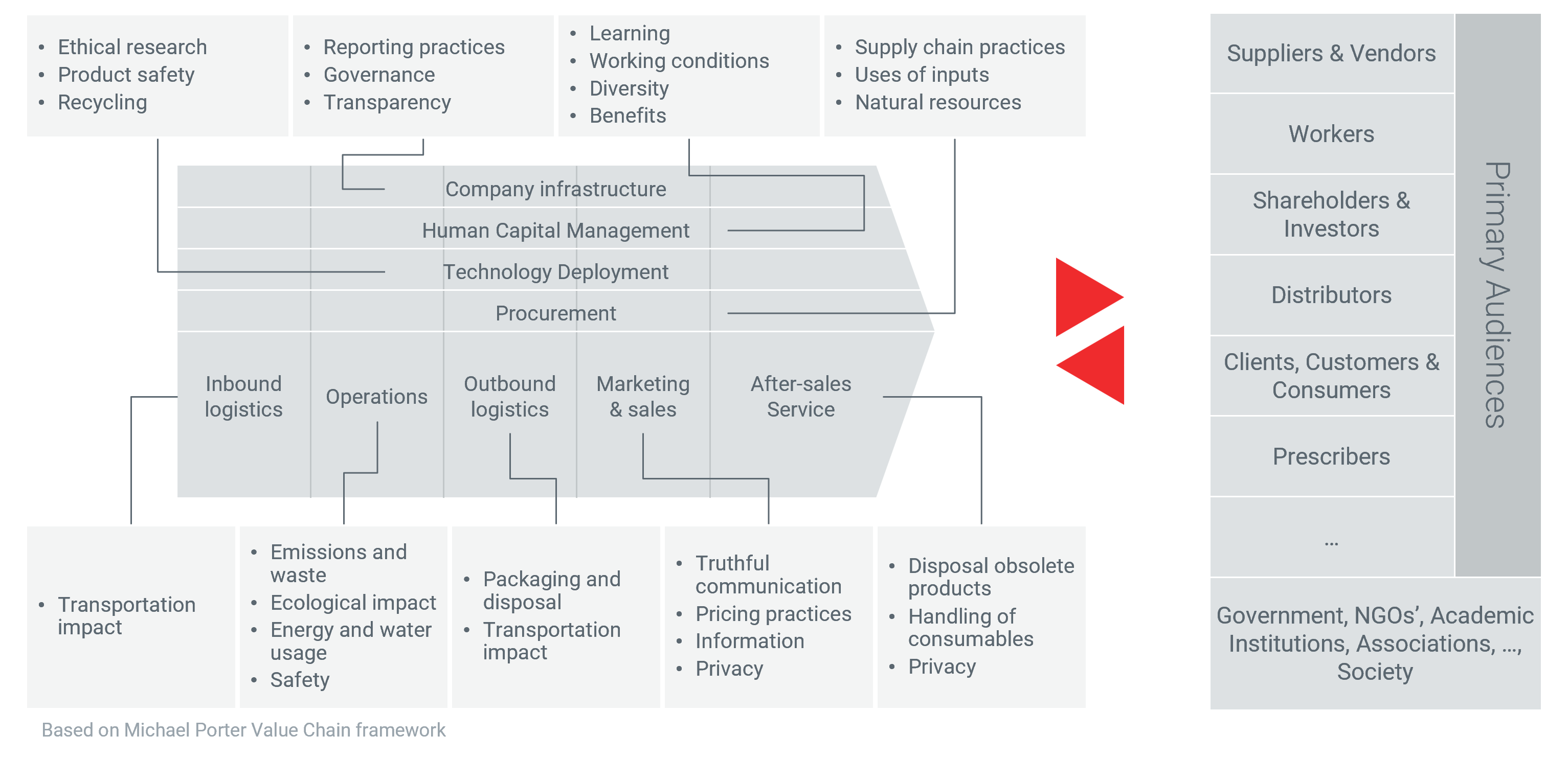By Lucia Böhles, Evan Müller, Leonardo Barbini and Louise Corneille | Bachelor in Management -BSc- Programme, ESCP Business School | Edited by Komoneed
Volkswagen Group Sustainable Value Chain Analysis
Volkswagen Group is a multinational automotive manufacturer headquartered in Wolfsburg, Germany. The company was founded in 1937 and is currently one of the largest automobile producers in the world, with 12 brands under its umbrella. These brands include Volkswagen, Audi, Porsche, Bentley, Lamborghini, Bugatti, and Ducati, among others.

Volkswagen Group’s mission is to provide sustainable, innovative, and high-quality mobility solutions to its customers, while also aiming to reduce the environmental impact of its products and operations. The company has a strong focus on research and development and has made significant strides in areas such as electric mobility and autonomous driving.
In addition to its strong presence in the passenger car market, Volkswagen Group also has a significant presence in the commercial vehicle market, producing trucks, buses, and other large vehicles.
Volkswagen Group has a global footprint, with operations in over 150 countries and a workforce of around 660,000 employees.
The Value Chain

Infrastructure
Like other large automotive manufacturers, the organizational Infrastructure at Volkswagen Group is complex and hierarchical.
Each division has its own management team and is responsible for developing and producing its own vehicles. Additionally, Volkswagen Group has a complex network of subsidiaries and joint ventures that operate in different regions of the world.
Overall, Volkswagen Group’s organizational Infrastructure is designed to ensure efficient and effective management of its diverse range of operations and businesses around the world.
Human Resources Management
Volkswagen Group is committed to providing a positive work environment and fostering diversity and inclusion among its employees. The company recognizes the value of a diverse workforce and has implemented programs to promote equal opportunities and support for all employees regardless of their background or identity.
The company’s human resources management also includes a focus on employee safety and well-being. Volkswagen has established occupational safety and health programs to ensure safe working conditions and prevent accidents or injuries.
Volkswagen offers various training and development programs to help employees advance in their careers and enhance their skills. The company also encourages innovation and creativity among its employees, offering opportunities for them to contribute ideas and suggestions to improve the company’s operations and processes.
Technology Development
Volkswagen (VW) has also been implementing various technology development initiatives to reduce its environmental impact and promote sustainable practices. Here are some examples:
- Electric vehicles: VW has been investing in the development of electric vehicles to reduce its carbon The company has developed various electric models, such as the Volkswagen ID.3 and ID.4, which are designed to be more environmentally friendly than traditional gas-powered vehicles.
- Renewable energy: VW has been investing in renewable energy to reduce its carbon footprint. The company has implemented various initiatives to increase its use of renewable energy, such as installing solar panels at its production facilities and purchasing renewable energy from external
- Sustainable materials: VW has been using sustainable materials in the production of its vehicles to reduce its environmental impact. For example, the company uses natural fibres and recycled materials in the production of some of its vehicle
- Battery recycling: Like BMW, VW has implemented recycling initiatives for the batteries used in its electric vehicles. The company has developed a process to recover valuable metals from used battery cells, such as cobalt, nickel, and
- Autonomous driving: VW has been investing in autonomous driving technology to reduce emissions and increase safety on the The company has developed various driver-assistance systems that can help reduce emissions and improve fuel efficiency.
These technology development initiatives are part of VW’s overall sustainability strategy, which aims to reduce the environmental impact of its operations and promote sustainable practices throughout the company.
Procurement
Volkswagen sources raw materials from various suppliers across the globe. The company has implemented a comprehensive procurement process to ensure that its suppliers meet the company’s standards for quality, sustainability, and social responsibility.
VW has established a Sustainability Rating system to evaluate suppliers based on their environmental and social performance, including factors such as carbon footprint, waste management, and human rights.
The company has also set a target to ensure that its supply chain is climate-neutral by 2050. VW has committed to responsible sourcing of raw materials, including conflict minerals and rare earth metals, by implementing traceability systems and conducting audits of its suppliers. The company is also a member of the Responsible Minerals Initiative (RMI), which is a global multi-stakeholder initiative focused on responsible sourcing of minerals.
VW regularly reports on its sustainability performance, including its procurement practices, in its annual Sustainability Report. The report includes information on the company’s progress towards its sustainability goals and initiatives to improve the sustainability of its supply chain.
Inbound Logistics
Volkswagen also uses a range of transportation suppliers for its inbound logistics, including shipping companies, trucking companies, and logistics providers.
The company has implemented a comprehensive logistics strategy that focuses on reducing transportation-related emissions and improving efficiency in its supply chain. For example, VW has implemented a program to increase the use of rail transport, which is generally considered to be a more environmentally friendly mode of transportation than road transport.
In addition to working with logistics providers, VW has also implemented various initiatives to improve the efficiency of its inbound logistics, such as optimizing transportation routes and implementing digital technologies to improve visibility and tracking of shipments. These efforts are part of VW’s overall sustainability strategy, which aims to reduce the environmental impact of its operations and promote sustainable practices throughout the company’s supply chain.
Operations
For Volkswagen, the company also has a significant environmental impact in the DACH market due to the production and use of its vehicles.
One of the main environmental impacts of Volkswagen’s franchises is air pollution. The most recent Volkswagen model has a CO2 emission of 119-121 g/km for petrol models and 29-32g/km for hybrid models.
The company has also faced significant backlash for its involvement in the “Dieselgate” scandal, where the company was found to have cheated on emissions tests and released excess amounts of harmful pollutants into the air. In addition to air pollution, the production and use of vehicles also contribute to greenhouse gas emissions and the depletion of natural resources.
The company has also implemented initiatives to reduce the environmental impact of its production facilities, such as investing in renewable energy and energy efficiency measures. Furthermore, Volkswagen has set a target to achieve carbon neutrality in its operations by 2050.
Some recent ecological measures:
- Volkswagen Group has installed energy-efficient production plants that make use of renewable energy sources like solar and wind This decreases the energy needed to run the facility and reduces the emissions from energy production.
- Volkswagen Group has taken measures to maximize the efficient use of its resources, such as water and raw This decreases the energy needed to extract and process these resources and reduces emissions from their production.
- Waste reduction: Volkswagen Group implemented waste reduction measures like recycling and This reduces waste generation and lowers waste disposal emissions.
- Volkswagen Group uses sustainable This includes the use of recyclable and biodegradable material. This helps reduce waste and emissions from waste disposal.
- Green logistics: Volkswagen Group implemented green logistics measures like using low-emission vehicles to transport and optimizing delivery This helps reduce emissions from logistics and transportation operations.
Outbound Logistics
Like BMW, the transportation and logistics used to move Volkswagen’s products and goods within the DACH market are responsible for a significant portion of its carbon footprint. However, specific numbers for Volkswagen’s packaging transportation impact on the environment are difficult to provide, as it depends on several factors such as the routes and modes of transportation used, the volume of goods transported, and the efficiency of the company’s logistics operations.
Marketing and Sales
Volkswagen uses various advertising strategies to promote its products and build brand awareness within the DACH market.
The company utilizes television and print advertising, including commercials and print ads in magazines and newspapers, to reach customers. In recent years, Volkswagen has also increased its digital marketing efforts, such as social media advertising, search engine marketing, and display advertising, to reach its target audience.
The company also sponsors events and collaborations to advertise its brand and vehicles. However, car advertising also has a negative impact on the environment, as it contributes to the perpetuation of a culture of consumerism and car-dependency. Additionally, the production and distribution of these advertisements consume resources and generate waste, and the advertisement itself can be misleading or fail to inform consumers about the environmental impact of car ownership.
Service
In the Service section, VW has launched a series of initiatives and measures to decrease their impact:
- Online customer service
- Remote diagnostics
- Energy-efficient technologies in customer service facilities
- Sustainable materials, including recycled and biodegradable material in customer service areas
Detailed Articles
- Environmental Impact of BMW, Mercedes-Benz, and VW in DACH
- BMW Sustainable Value Chain Analysis
- Mercedes-Benz Sustainable Value Chain Analysis
- Volkswagen Group Sustainable Value Chain Analysis
Sources
- BMW-Group-Lobbying-Policy-March-2021.pdf (bmwgroup.com)
- BMW Leadership and BMW Organizational Infrastructure – Research-Methodology
- More sustainable logistics at the BMW Group
- Sustainability | Volkswagen Group (volkswagen-group.com)
- VW Group Homepage
- From mine to factory: Volkswagen makes supply chain transparent with blockchain | Volkswagen Newsroom
- Intelligent supply and transportation control at the VW Group (eurolog.com)
- Human rights in the supply chain | Mercedes-Benz Group > Sustainability > Human rights > Supply Chain
- Sustainable supply chain management at Daimler | Mercedes-Benz Group
- Mercedes-Benz Launches Sustainable Supply Chain Initiative for EV Battery Sourcing – ESG Today
- Mercedes-Benz AG and Hydro partner for sustainable aluminium supply chain – Just Auto (just-auto.com)
Images
- Moerschy in Pixabay
- Rezaqorbani in Pixabay
- Daniel Andraski in Pexel
- Cottonbro Studio in Pexel
- Andrea Piacquadio in Pexels





who knew analyzing VWs value chain could be so interesting? #sustainability #corporatesocialresponsibility
Who knew Volkswagens value chain could be so fascinating? Sustainable progress for the win!
Are you serious? The Volkswagen scandal exposed the companys unethical practices and disregard for the environment. Hardly what I call sustainable progress. Lets not forget the damage they caused.
I cant seem to find the article you mentioned, but Im curious about VWs value chain. Are they really sustainable or just talk?
Ive done my own research, and it seems like VW is putting in real effort to make their value chain sustainable. Theyre investing in electric vehicles and reducing emissions. But hey, skepticism is healthy. Dig deeper and form your own opinion.
this article on VWs sustainable value chain analysis is mind-blowing! Who knew cars could be so eco-friendly?
I hate to burst your bubble, but VWs sustainable value chain analysis is just greenwashing at its finest. Dont be fooled by fancy words, their track record speaks for itself. Lets not forget about the emissions scandal that rocked the company a few years back.
I never knew the VW Group had such a deep analysis of their value chain! Impressive stuff!
I cant believe VW Group is analyzing their sustainable value chain. About time, right? #EcoFriendlyCars
Actually, its not that impressive. VW Groups complex value chain has been plagued with scandals and unethical practices. Its time we focus on companies that prioritize transparency and sustainability.
the VW Groups sustainable value chain analysis is mind-blowing! Who knew cars could be so eco-friendly?
Interesting read! Never thought about how infrastructure plays a role in sustainability. 🌍🚗
Youd be surprised how interconnected sustainability and infrastructure are! Its all about building a future thats environmentally friendly and efficient. So next time you hit the road, remember that even your cars impact on the planet depends on the infrastructure it relies on. 🌱🏗️